- Learning time
- 30 minutes
- First play time
- 80 minutes
Villagers
Designed by: Haakon Gaarder
In Villagers every player is building their own village; pretty much starting from scratch and hoping that their village will be the most productive/alluring/point-scorey come the end of the game.
There’s no board: the game consists of villager cards you add to a growing tableau on the table representing your village. Everyone begins with 5 cards in their hand and one Founder villager on the table. Six starting villager cards are in a shared area called The Road; these are wanderers looking for a new home, and each one comes with their own special vocation – one is a carpenter, another a blacksmith and so on. In each round there is a drafting phase where everyone adds cards from the road into their hand (when a card is taken from the road, the space is immediately refilled) and following that, a building phase where you play cards from your hand into your village.
That simple mechanic forms the nub of the game, but as you might expect there’s a little more going on than pick up cards/play cards. Firstly, every villager is a member of suit, and the suit cards not only match but interlink: you can’t, for instance, play the very rewarding Jeweller into your village unless you already have the Miner/Seeker/Spelunker present, as most suited cards are part of a hierarchy. Each hierarchy begins with a Basic Villager, and these are always available to you in the building phase, but with the caveat that they cost you any card from your hand. The superior cards in each hierarchy are more rewarding, so let’s look at exactly what those rewards are.
There are four basic symbols to look out for. The first is food: for every red food symbol in your village, you can draft an extra card in every subsequent round. Every black house symbol present allows you to build extra villagers in the build phase. Gold will reward you with money in the two scoring rounds of the game, and silver only the second scoring round: the former simply brings a flurry of coins from the bank, whereas how the latter scores depends on the make-up of your village; bringing you more money for certain cards or card combinations. As money is essentially points, these are just as crucial as food and houses.
Lastly some cards come with a padlock: these can’t be played without paying another villager (one with the unlocking ability) two coins for the privilege. If the unlocking card is owned by another player, the money comes from your own supply and goes directly on the card in question. If you own the card instead, you pay it from the bank. And if no-one owns the card, you pay the bank. In the scoring rounds these cards with money sat on them collect a matching amount from the bank.
When the second scoring round is triggered, the game ends: all points are tallied and the player with the most cash wins!
The guru's verdict
-
Take That!
Take That!
There's one card that allows you to 'steal' a villager from anyone, but the main thrust of take-that-ery becomes more evident the more you know the cards and what they do. If someone has the Jeweller, then taking the seeker may mean they can't play it.
-
Fidget Factor!
Fidget Factor!
Despite the reasonably simple rules, Villagers offers the occasional ponderous pause as you work out what exactly works best for you.
-
Brain Burn!
Brain Burn!
It's mostly about seeing which cards combine best: some (Solitary) cards always sit by themselves, but the Villagers that rely on the support of others in those 'chains' are usually the ones you really want.
-
Again Again!
Again Again!
Not all cards come out in every game, so there's a sliver of the unexpected as well as opportunity to try different strategies.

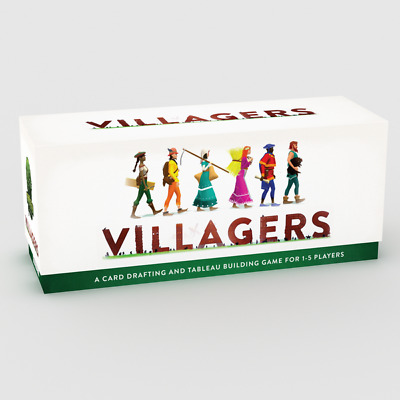

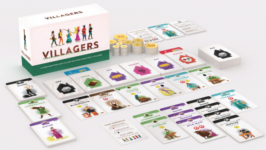
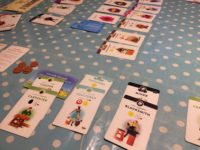
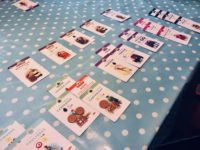




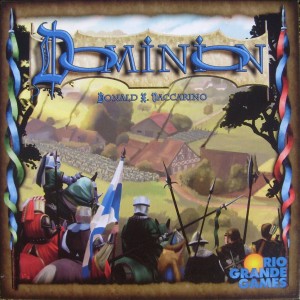

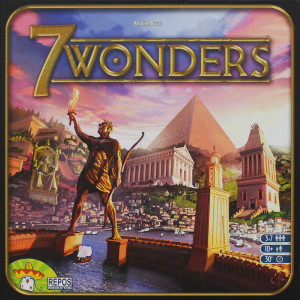

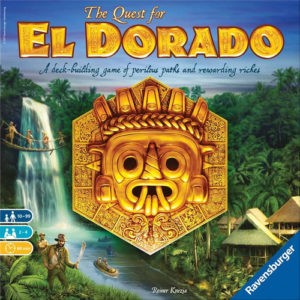
Sam says
Villagers might not set your pulse racing in the way some games do, but as a simple-ish game of set collection it works very well; thematically, each villager begets another and your village literally grows across the table (quite a lot in fact; don't even attempt this on a small table with more than two players!) The cards are pretty and it all looks very engaging. Familiarity will see your scores increase too, and what at first looks like a getting-on-with-your-own-business affair changes complexion: I found that to stop my son serially winning I needed to watch what he was doing and sometimes take cards I didn't need just in order to hamper his progress. A very nice family-weight game that hits the sweet spot of being light enough for kids to pick up but dense enough for adults to enjoy.